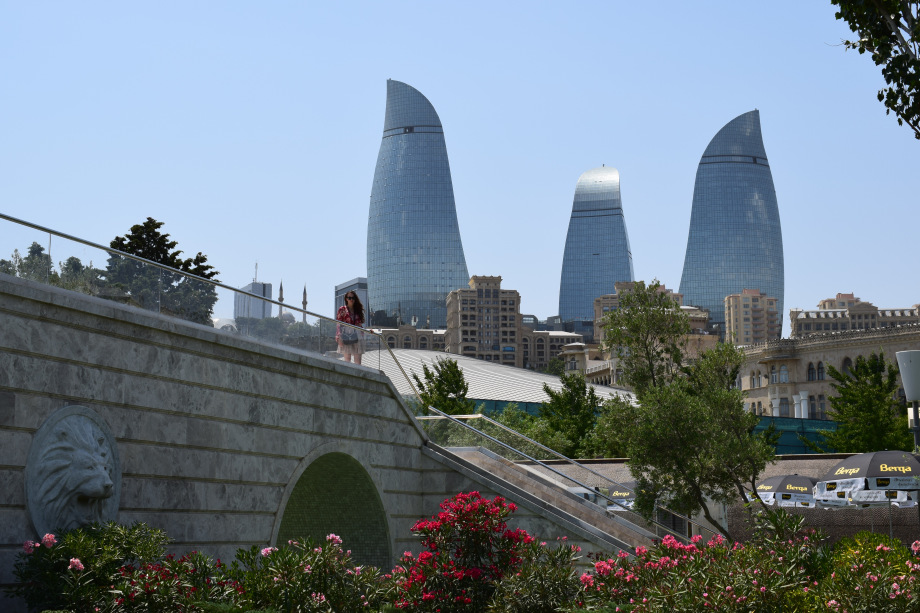I:
Evgenii and I had our own unique reasons for wishing to visit Baku. Having been born in the city, he wanted to visit the country that he had left aged four. I on the other hand, was drawn only by a vague sense of mystery and the images of the Caucasus left by Lermontov’s A Hero of Our Time.
Baku is the largest city in the Caucasus region and located on the shore of the Caspian sea. Arriving at the glowing Heydar Aliyev airport, we were pleasantly surprised by both the elegance of the building, sprinkled with soft carpets and nature-inspired structures, and the speed at which we passed through immigration control, electronic visas in hand.
A visitor to the city is struck by the prevalence of iconic buildings, contrasting with the city’s carefully preserved historic centre. The diverse landscape appears a reflection of the Baku’s ancient past, oil wealth, and the country’s contemporary political culture. The futuristic Heydar Aliyev Cultural Centre, similarly named after the former president, drew us twice around its mesmerising white globular walls. Yet interestingly the interior of the museum seems curiously underused, housing an oddly random mix of exhibitions: the Aliyev family, dolls, and photography from Namibia.
Despite the oppressive summer temperatures, the centre of Baku is lush with greenery. In a seemingly successful attempt to shift away from its reputation as the Black City, the government has invested heavily in expanding the seafront boulevard. The Old City, a World Heritage Site which houses Maiden Tower and the Palace of the Shirvanshahs, also offers an oasis of calm amongst the ultra-modern surrounding buildings. Even so, the daytime heat can be overpowering and we quickly decided to rent a car.

E:
There are numerous car rental parks in Baku, offering cars from 20 to 1,000 British pounds per day. After a lengthy discussion, we settled on a Chevrolet Camaro 6.2 litre engine, costing approximately 100 pounds a day. This was a peak season price.
Driving in Baku is madness. Everyone appears impatient, vigorously honking their horns and darting between lanes without using indicators. Yet equally, the city is teeming with traffic police, seemingly waiting for you to do something wrong. It could be said that Baku is unusual in that a simple tourist can frequently come into contact with corruption; particularly when using the city’s busy roads.
After one such unfortunate event, in which the car was taken and held ransom in a scruffy underground car park, we arrived late to the Gobustan National Park. A short discussion with officials highlighted that the Park was indeed shut; however, for fee it could be opened for a private tour. Our local guide described in detail the meaning of the thousands of ancient engravings which covered the rocks, and another official took us to nearby bubbling mud volcanoes, where young men were smothering themselves in the skin-redeeming mud.
From the National Park we gazed down at the oil infrastructure in the distance, reminding us of the origins of the city’s wealth. Our moment of peace quickly interrupted by a policeman, who wanted to have his photograph taken with our car.
Share this:





